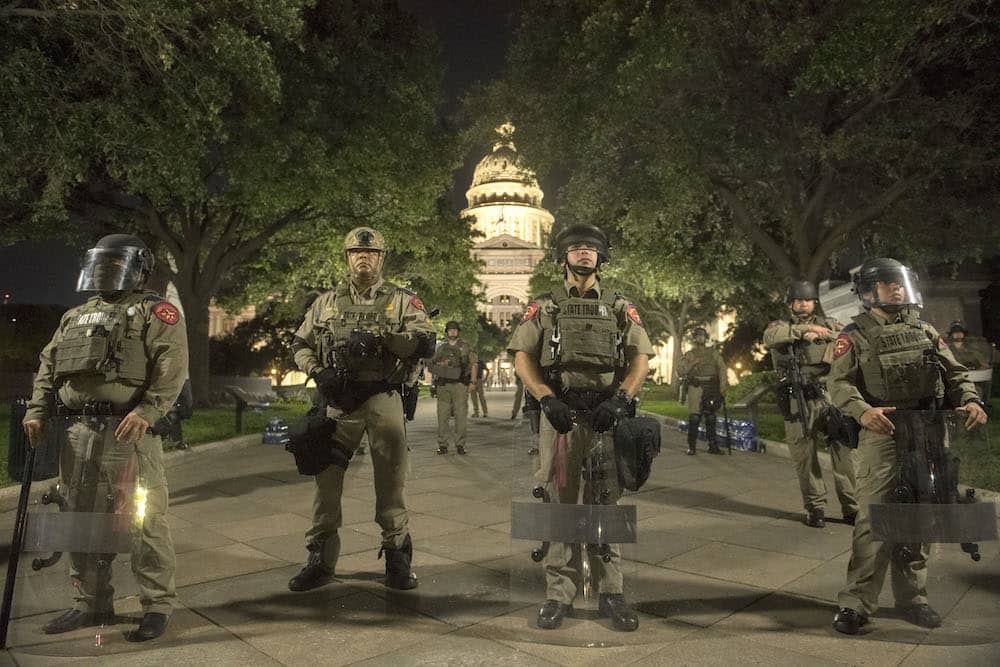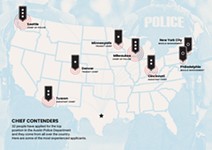Mayor OK's Deal to Have State Troopers Patrol Austin Streets
And they don’t have to play by our city’s rules
By Austin Sanders, 6:20PM, Mon. Mar. 27, 2023

Texas Department of Public Safety troopers will begin patrolling the streets of Austin soon following an agreement brokered by Mayor Kirk Watson, Interim City Manager Jesús Garza, Gov. Greg Abbott, and Lt. Gov. Dan Patrick.
The agreement is intended as a stopgap measure to make up for staffing shortages within the Austin Police Department that have existed for at least the past five years. DPS troopers and special agents will assist with “violent crime and traffic issues,” according to a news release announcing the partnership, though they will also back up Austin Police officers during “other emergency situations.” The announcement comes days before the meet-and-confer agreement between the city and Austin Police Association expires, March 31. More than 70 APD retirements are expected before the end of the month.
Despite APD’s inability to fill all of the officer positions the department is budgeted for, Austin remains one of the safest cities in the country. Violent and property crimes declined year-over-year in January and February, according to APD data. The number of homicides in Austin declined last year compared to the previous year – the first time that has happened in four years. Austin continues to rank as one of the safest cities of its size, according to some reports.
The fact that Austin remains safe could explain why at a press conference announcing the state-local partnership, Watson and Chacon repeatedly referred to the importance of Austin residents feeling safe. "As mayor of Austin my top priority is that the people of Austin both are safe and feel safe,” Watson told reporters at a press conference, Monday, March 27. Later, Austin Police Chief Joseph Chacon echoed the mayor. “It is our mission … to not only have residents be safe, but to feel safe. And if you don’t feel safe, even if you are, it just doesn’t make for a good community.”
Watson said that the idea for the local-state law enforcement collaboration surfaced in a conversation with Patrick Friday, March 24. Abbott and Garza were looped in and three days later, they reached a tentative agreement. Officials in Dallas and San Antonio have made similar agreements, but this has never been attempted in Austin. It is a startling reversal after Mayor Steve Adler’s tenure, during which Abbott and other Texas Republicans regularly threatened the city with occupation by state law enforcement. Instead, Watson applauded the partnership as a kind of bipartisan victory. The partnership “arose out of a positive working relationship between the capital city and the capital of Texas that will benefit our shared constituents,” Watson said.
Echoing a frequent talking point voiced by the Austin Police Association, Watson pointed to City Council’s decision in 2020 to cancel cadet classes at the Austin Police Academy as one that “amplified” the department’s inability to recruit and retain officers. Perhaps, but the mayor left out crucial context. For one, before Council voted to cancel classes, APD was already carrying somewhere around 200 officer vacancies – that is, positions they were unable to fill even before the tumult between law enforcement and community erupted in cities across the nation throughout 2020.
Second, and more importantly, a key motivating factor in the decision to cancel cadet classes was the mounting evidence that the culture within the Academy, and throughout APD broadly, was in need of major reform. Specifically, the Academy was found to use a “paramilitary approach” to teaching cadets that did not “align well with the principles of community policing and problem-solving, which are based on collaborations and partnership,” according to an internal APD report.
Chacon could not say how many troopers would be deployed in Austin and where they would patrol, only that such strategies were still under review and decisions would be made in a “data-driven” way. It is also unclear how DPS troopers will be instructed to enforce local ordinances unique to Austin, like those that regulate how city cops enforce laws criminalizing the possession of marijuana and abortion. DPS troopers have jurisdiction in Austin and across the state, but are not required to adhere to the local ordinances and policies governing the behavior of officers employed by APD.
Got something to say on the subject? Send a letter to the editor.
A note to readers: Bold and uncensored, The Austin Chronicle has been Austin’s independent news source for over 40 years, expressing the community’s political and environmental concerns and supporting its active cultural scene. Now more than ever, we need your support to continue supplying Austin with independent, free press. If real news is important to you, please consider making a donation of $5, $10 or whatever you can afford, to help keep our journalism on stands.
June 28, 2024
June 26, 2024
Texas Department of Public Safety, DPS, Kirk Watson, Dan Patrick, Greg Abbott








